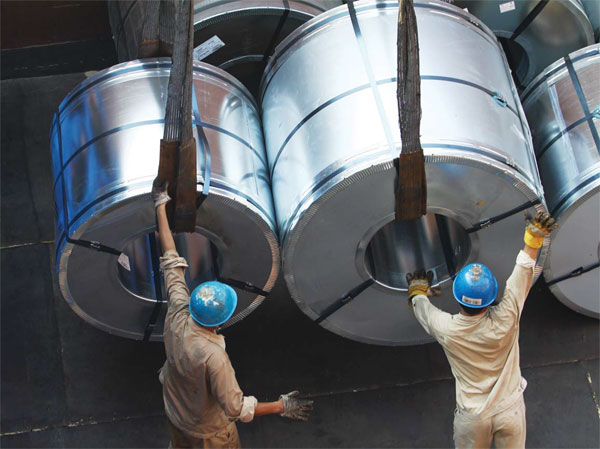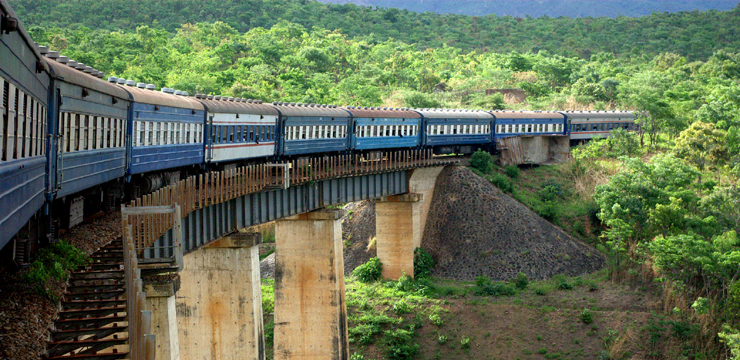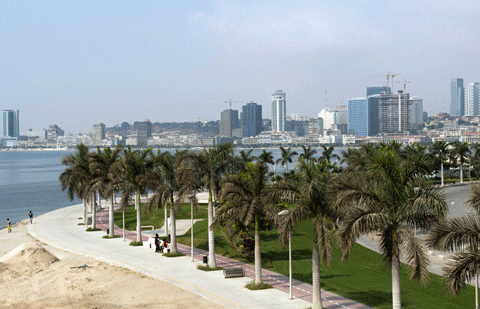Steeled for growth
Updated: 2014-05-02 09:24
By Wang Chao (China Daily Africa)
Comments Print Mail Large Medium Small
|
Wuhan Iron and Steel says it is heavily dependent on raw material supplies from Africa. Provided to China Daily |
Chinese steelmaker turns to Africa to offset tough market conditions at home
When the going gets tough, Wuhan Iron and Steel gets going seems to be the refrain that is propelling the Chinese steelmaker to dig deeper in Africa for natural resources, even as it encounters rough headwinds in the domestic market.
Though China's largest flat-rolled alloy steel producer has been tapping overseas markets, especially in Africa, to bolster raw material supplies, it has come with increased risks, says Song Ruilin, general manager of the Central African division at Wuhan Iron and Steel.
"We really do not have much of a choice as our domestic operations are heavily dependent on raw material supplies from Africa," he says.
According to Song, like other Chinese steel companies, Wuhan Steel too had its heyday a decade ago, when steel was in short supply and demand had peaked. That situation reversed a few years ago with supplies far outstripping demand.
Companies like Wuhan Steel felt the pinch even more after the government decided to focus more on sustainable development, rather than infrastructure-led development, company officials say.
By 2013, the company was forced to cut steel production capacity to 40 million tons a year. Its iron ore requirements had by then reached 64 million tons. With the mines owned by the company not enough to meet the demand, the company had to rely on overseas resources to make up the shortfall, Song says.
"A decade ago, looking for overseas iron ore mines meant more profits. But the same now comes with added responsibilities," he says.
Last year, the overall profit margin of the steel industry was only 0.13 percent, and about 40 percent of the companies were running in deficit, say statistics provided by the China Iron and Steel Association. Association sources say that the profit from a ton of steel was not even enough to buy an ice cream, indicating the really wafer-thin margins that the industry is operating in.
"The capacity is there and so also the workers. We have no choice but to keep the plant humming, even with the slim profit margins," Song says.
Talking more about the company's overseas iron ore supplies, Song says the company signed its first major iron ore deal in Canada in 2009, for an estimated transaction value of about $4 billion.
However, the Chinese steelmaker is betting big on the Bong mine in the Western African nation of Liberia. Spread over 78.47 sq km, and with proven resources of more than 4.09 billion metric tons, the mine is expected to provide the Chinese company with 10 million metric tons of high-quality iron ore every year when it starts mass production in 2017.
The first phase of the mining project currently provides Wuhan Steel with 1 million metric tons of iron ore every year. The project is a joint venture between Wuhan Iron and Steel, China Development Bank and a private Chinese company. Wuhan Iron and Steel holds a 60 percent stake in the project and is responsible for day-to-day operations, Song says.
What really makes the Liberian mine an attractive investment is that most of the iron ore is at shallow depths, making extraction easy. The ore-bearing vein is also continuous, giving optimism for sustained growth. "Over the next three to five years, we will increase our investment to $2 billion," say company officials.
The mining deal is also the biggest foreign investment deal in Liberia to date and provides jobs to more than 300 local people. "Due to the civil war, there are not too many skilled workers in Liberia. We are providing regular training sessions so that we can train and employ more workers locally," Song says.
Wuhan Steel is also investing in an iron ore mine in Madagascar. To date, the company has proven overseas iron ore reserves of 40 billion tons, through acquisitions, joint ventures and stake deals.
Although most of its mines are in the pre-exploratory stage and not yet able to cover a majority of the raw material requirements, the company says overseas iron ore resources will gradually become the mainstay.
At the same time, company officials admit that tapping natural resources is not that easy in Africa. Giles Taylor, head of the steel and mineral division at Standard Chartered Bank's corporate finance department, says that several African countries have realized the strategic value of their natural resources and are raising the entry barriers for foreign investors.
For instance, Guinea has recently passed legislation that automatically gives the government a 15 percent stake in all mining ventures. Zimbabwe, on the other hand, requires the localization rate (including hiring local workers and processing locally) of a foreign company to be above 51 percent. The Democratic Republic of Congo has recently suggested raising the free government stake among resource companies from 15 percent to 35 percent.
"In some countries, corruption is still a big issue," Taylor says, adding this lack of transparency is also creating hardships for investors.
Wuhan Iron and Steel also feels the same pressures but company officials are confident about facing the situation.
"Many African countries need to rejuvenate their economies. Without good agricultural or manufacturing bases, they have to rely on selling mining rights for quick money. But after decades of development, they have got some bargaining chips in hand, and they want to use it as leverage," Song says.
To bid for the mining rights among more competitors and a harsher regulatory environment, the company has to take care of all parties' benefits: African governments, local workers and themselves.
With the contract for the iron ore mine in Liberia, Wuhan Iron and Steel had to sign a lengthy document specifying its rights and obligations, Song says. For example, the company's rights include using the harbor and mining the iron ore, and their obligations include paying taxes to the government and hiring a certain number of local workers.
Though the market is getting more regulated, the fight for resources is transforming China. From 2002 to 2008, private Chinese companies were more enthusiastic in buying mining rights than state companies, but now everyone seems to be more cautious, Song says.
"In terms of international competition, the multinationals from Europe and the US seem to be more interested in oil and gas resources. The competition for mining rights is not as fierce," Song says.
For historic reasons, Western countries, especially the former colonial powers, still own a large proportion of oil and gas rights in Africa, and few Chinese companies have managed to break into this area.
"It is hard to manage resources business in Africa, but in the long run, there are several opportunities," Song says. "There are no steel companies in most of the African countries. They will need foreign companies to create the manufacturing infrastructure for them."
wangchao@chinadaily.com.cn
(China Daily Africa Weekly 05/02/2014 page6)








